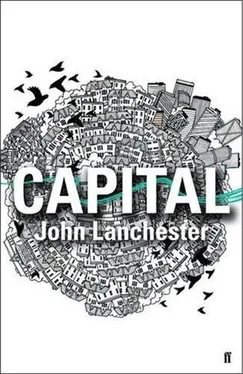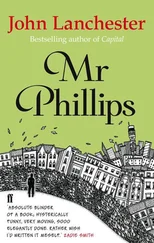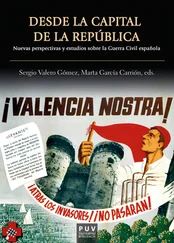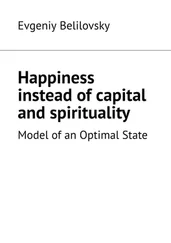Zbigniew was not prone to irrational fears, and he felt there was nothing irrational about his anxiety. He had held on to the money for far too long and now, whatever he did, he felt he had compromised himself. Not giving the money to Mrs Howe straight away had been a form of fault. At 5 per cent interest, £500,000 invested for three months was more than £6,000: that was how much money he had cost her in cash by not acting. By not doing anything he had stolen from her. He sold all the stocks in his modest portfolio, as a way of… as a way of… he wasn’t sure what it was a way of. The money he had invested in the course of his time in London had, thanks to the turbulent market conditions, shrunk by about 15 per cent.
He should give the stolen money back. And yet… and yet what? There was the cottage, his father’s cottage, his parents’ golden years of retirement, the thing in all the world he most wanted for them, bought with stolen money. That was the problem. He would never be able to tell his father what he’d done; which meant that what he’d done would never seem right. It would be a lie, it would poison everything. He couldn’t do it. Yes, he should definitely give the money back. But he felt he couldn’t do that without telling someone. It must be the residual imprint of Catholicism. He had to confess. He had to have absolution. The weight of the secret was just too great to bear. And also there was a glimmering, flickering thought that he was reluctant to admit too directly, but which was certainly there. If he confessed to someone about the suitcase with half a million pounds in it, the suitcase which had never been missed, the suitcase whose owner had died long ago and which now belonged to someone who knew nothing about it and whose life would not be affected by its absence in any way, someone whose house was worth millions already, so someone (just to get this crystal clear) who was already rich, who didn’t need or know about or miss or suspect the existence of this money; and in the mean time the money was in the possession of him, Zbigniew, whose life it would transform utterly, whose many ambitions would be immediately fulfilled just by taking ownership of this cash – the years of ease and comfort for his parents, the chance to set himself up in life, the sudden access of capital which would let him move on, employ people, create wealth, share happiness, give his father one rose-covered cottage and give Matya another one, and a bed with a good firm mattress too – so there was on the one hand oblivious richness and on the other deep desiring and deserving need – well, maybe, if he confessed to a person about this predicament, this dilemma, maybe, just maybe, the person to whom he confessed would say, don’t be an idiot, you have to take the money for yourself, are you crazy? It would be an injustice not to. It would be theft – theft from yourself. That’s what the person to whom he confessed might say. Perhaps. He hoped. On the other hand – and Zbigniew had come to feel that this was more likely, even as he had grown resolved on his confession – she might think there was nothing to discuss. She might go the exact other way. She might say that it was so obvious that he had no choice but to hand over the money – that it was so morally clear-cut – that he had in effect stolen the money. She might conclude that Zbigniew was not the man she had thought he was, that anyone who could do such a thing as sit on a suitcase containing £500,000 of someone else’s money – she might think that a man who would do that could not be trusted. The conversation in which he told her about the suitcase might be the last conversation they ever had.
With these thoughts, full of apprehension, Zbigniew got dressed and went downstairs. Number 42 Pepys Road was almost finished. The paintwork downstairs needed touching up, then Mrs Leatherby had to look around and point out things that weren’t satisfactory, and then they were done. The Pepys Road era of Zbigniew’s life would be over. Maybe another part of his life would begin; he certainly hoped so. It all depended on what Matya said.
‘What, now? Right now? You don’t mean right now?’ said Zbigniew.
They were in a café on the high street, leaning with their heads close together. The agenda for the date had been coffee, film, dinner, and then who-knew-what. She had never looked lovelier. Now, though, it seemed there was a different plan.
‘Right now. This minute. From here – you take it from here and you go to see her. Call first. But you go to see her.’
‘But it’s Sunday afternoon!’
‘So what?’
Zbigniew blew out his cheeks.
‘Right now,’ he said. That was Matya’s solution to his problem. She had not judged or criticised or second-guessed – which, he realised, was what he had both expected and feared. She wasn’t the type to say, take the money and run. And he was glad that she wasn’t like that. He was even gladder that she hadn’t done a Piotr and denounced him or told him off. But she had been clear and firm on what to do next, and it wasn’t what Zbigniew had expected to hear. He had been braced for more of the agonising that had been going on inside him. Instead, she simply told him to take the suitcase to Mrs Leatherby straight away: right now.
Moving slowly, as if daring Matya not to stop him, he fished his mobile, the Nokia N60 which had changed his life, out of his pocket. She watched. He found the number, held it up in front of Matya so she could see. Matya made no gesture. So Zbigniew pressed the dial button.
The phone rang six times. OK, she was out. Zbigniew moved to break the connection and then -
‘Hello?’
‘This is Zbigniew. The builder. I need to come and see you. Now, today.’
‘Oh! What’s wrong?’ said Mrs Leatherby.
‘Nothing but I need to come and see you. I can’t say over the mobile. You are at home?’ Of course she was, that was where he had called her. Sounding about as worried as a person could possibly be, Mary confirmed that she was at home. Zbigniew said he would be there in about an hour and a half, depending on the train times.
‘And now you have to come with me,’ he said to Matya. This was his revenge.
‘Why?’ Matya folded her arms.
‘I can’t go to this place I’ve never been before, and by the way I have no idea where exactly it is, carrying a suitcase with half a million pounds in cash, on my own.’
That was his excuse, anyway. She had grumbled a little, and pretended to prefer the idea of sitting alone in her flat, listening to the radio, before giving in. They had left the café and gone back to Pepys Road, Matya’s first time there since leaving the employ of the Younts. Zbigniew had taken her up to the room where he was sleeping – which stank of paint, something he always noticed when he came in from outside – and showed her the suitcase. Matya had looked at it, then looked at him, and said, a little sadly:
‘This is probably the only time in our lives we’ll ever see that amount of money in cash.’
And now Matya sat across from Zbigniew in the rattling carriage of the train to Chelmsford. The train kept seeming to have got out of London into the countryside, before being reswallowed by the suburbs. At one point there was a stretch of green fields, and Matya thought they’d got out of the city, but then there was a long sequence of tower blocks. Some sections of the journey were as beautiful as anything in Hungary, and some were as ugly as anything in Hungary.
The trip was supposed to take forty-five minutes, but at one point the train stopped in a field, without explanation, for a quarter of an hour, so now it was late. The compartment was full. Across from them sat a young man, wearing a baseball cap pulled down, staring straight in front of him while he listened to music over headphones and chewed gum. There was a can of lager on the table in front of him. Zbigniew had thought about putting the suitcase on the overhead luggage rack, but then found his head filled with pictures of the train braking or jolting and the suitcase being thrown down and bursting open and the air filling with ten-pound notes, the passengers gaping at him while he crawled around scrambling to pick up the cash… so no, not the overhead rack. Not the space for luggage at the end of the compartment. In the end he put it in front of his seat with his legs folded over it and every time Matya looked at him she had the impulse to laugh.
Читать дальше












